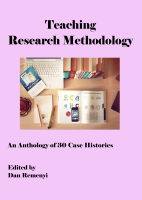Top Level > Books > Excellence Awards

PDF VERSION- Innovation in the Teaching of Research Methodology Excellence Awards: 30 Case Histories
Edited by Dan Remenyi
Teaching research methodology is a major challenge for many academics.
To be a competent researcher it is necessary not only to acquire skills in the techniques, but also to have an understanding of the philosophical issues which underpin academic research. Traditionally, these are often not well understood. As a result, many research methodology courses are quite superficial with the emphasis being placed on collecting and analysing data. This is not really sufficient for the purposes of quality academic research.
There are many academics who believe that research methodology is difficult to teach. The tried and tested classroom-based approaches used in most other subjects do not sufficiently address the nuances which students need to be aware of in order to understand the implications of research techniques adequately to become a successful academic researcher. This is because ultimately research methodology needs to be about more than simply collecting data and then manipulating it. However, some good and innovative work is being done in this field in various parts of the world. And many universities are changing the way they teach research methodology to help educate and develop young researchers.
This anthology consists of 30 case histories describing the teaching of research methodologies which have been selected from over 100 submissions which were presented at the European Conferences of Research Methods over the past four years. These are a diverse range of examples from various parts of the world showcasing different aspects of teaching research methodologies and the challenges faced in helping students develop skills in this respect. They range from embedding research methodology into university courses to community projects such as mentorships and workshops to providing access to experienced researchers. These cases will be valuable to anyone who is involved in either teaching or developing research methodology programmes. The case histories provide descriptions of each of the teaching initiatives.
It is believed that being aware of these approaches to teaching will provide helpful insights into the types of issues academics are coping with when teaching research methodology today in various parts of the world.
